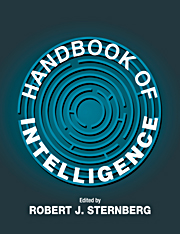Book contents
- Frontmatter
- Contents
- Preface
- Contributors
- PART I THE NATURE OF INTELLIGENCE AND ITS MEASUREMENT
- PART II DEVELOPMENT OF INTELLIGENCE
- PART III GROUP ANALYSES OF INTELLIGENCE
- PART IV BIOLOGY OF INTELLIGENCE
- PART V INTELLIGENCE AND INFORMATION PROCESSING
- PART VI KINDS OF INTELLIGENCE
- PART VII TESTING AND TEACHING INTELLIGENCE
- PART VIII INTELLIGENCE, SOCIETY, AND CULTURE
- PART IX INTELLIGENCE IN RELATION TO ALLIED CONSTRUCTS
- Author Index
- Subject Index
Preface
Published online by Cambridge University Press: 05 June 2012
- Frontmatter
- Contents
- Preface
- Contributors
- PART I THE NATURE OF INTELLIGENCE AND ITS MEASUREMENT
- PART II DEVELOPMENT OF INTELLIGENCE
- PART III GROUP ANALYSES OF INTELLIGENCE
- PART IV BIOLOGY OF INTELLIGENCE
- PART V INTELLIGENCE AND INFORMATION PROCESSING
- PART VI KINDS OF INTELLIGENCE
- PART VII TESTING AND TEACHING INTELLIGENCE
- PART VIII INTELLIGENCE, SOCIETY, AND CULTURE
- PART IX INTELLIGENCE IN RELATION TO ALLIED CONSTRUCTS
- Author Index
- Subject Index
Summary
We make judgments about people's intelligence everyday – in conversations with people, in reading about people, in listening to news stories about people. Societies also have designed special occasions in which intelligence can be assessed – intelligence tests, aptitude tests, job interviews, university application essays, and the like. But what is this intelligence about which so many judgments are being made?
The Handbook of Intelligence provides what is perhaps the most comprehensive account available of what intelligence is, how it is assessed, how it is developed, and how it affects society and its institutions. There are few questions about intelligence that are not addressed somewhere in the scope of this handbook. The handbook is written not only for psychologists but for any educated individual with an interest in the study of intelligence. Educators, anthropologists, sociologists, philosophers, cognitive scientists, neuroscientists, and laypeople alike will find the chapters of this book written in a manner that is both easily readable and quickly understandable. Because the coverage of the book is so broad, it can be read as a reference on an as-needed basis for those who would like information about a particular topic, or from cover to cover either as a sourcebook or as a textbook in a course dealing with human intelligence.
The Handbook of Intelligence complements the Encyclopedia of Human Intelligence that I edited (Sternberg, 1994) in that it provides a topical rather than an alphabetical account of topics in human intelligence. Of course, the handbook is also more up-to-date.
- Type
- Chapter
- Information
- Handbook of Intelligence , pp. ix - xPublisher: Cambridge University PressPrint publication year: 2000

